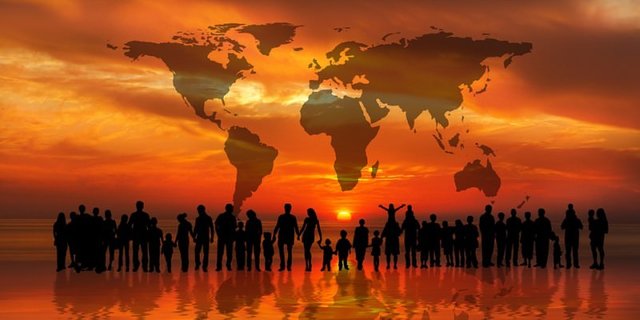Dear Steemits: This Is A Plea Dear Humans To Begin Stepping Lighter On Our Delicate Little Planet
Despite the debates, which appears to be the current rage regarding the increasing climate change, that we're experiencing here on planet Earth, as well as its sustainability, the majority of us still remain blindly unaware, of our own personal carbon loads that we each place on the planet.

The initial ideal of an Ecological Footprint, was created explicitly for lowering that load, as well as to bring awareness using basic simple concepts, which everyone could hopefully understand.
So what is an ecological footprint? An eco footprint, is the measurement of human usage, and the demands that are placed on all of the Earth’s ecosystems.
This is a standardized measurement, of the consumption of natural resources as well as the capital resources, compared to the planet’s current ecological capacity, and its ability to be able to regenerate those resources.
It also includes, the exact space which is required to assimilate the wastes, that the same population group produces, wherever on the planet that the relevant land or the water may be located.
The Rich Are Overpowering The Poor
This is expected and quite obvious. The countries of the world which are the most wealthiest, has the largest “eco” footprint per capita.
As an example, the average North American person, requires close to 8 hectares per dwelling, to be able to adequately support their current consumer lifestyles.
Japan, along with some European countries, are currently a lot more material and energy efficient, by just surviving on 4 to 5 hectares per capita, on average.
But if you compare these numbers that the “rich countries” use, with just the half-hectare that’s required to supply an average dwelling in Africa or India, the number as well as inequity becomes startling.
The differences in the eco based footprint, clearly states that there’s social injustice. There is an obvious widening gulf, which is separating the lifestyles of the wealthier countries, and the individuals from those countries which are historically and chronically impoverished.
The average North American, can potentially weigh up to 32 times more heavily on our planet resources, this based on eco-terms, when compared to the citizens from the world’s most poorest countries.
The Drain On Sustainability
So you may be wondering, what this has to do with sustainability. Well, plenty. In the rich densely populated countries of the world, consumer demand now outstrips domestic supply.
The ecological footprints of certain countries, now exceeds the land’s capacity by a ratio factor of at least five to six. These are the countries, which are currently running massive ecological deficits compared to the rest of the world, this based again in ecological terms.
The current global average human ecological footprint, happens to be around 2.2 hectares, while there’s only around 1.8 hectares of productive water and land, that’s available per capita.
What this means, is that we as humans have already over used the long-term carrying capacity of what the planet is able to provide, by more than 22% percent. So humanity, is currently consuming a lot more than what the ecosphere is able to produce.
We’re living as well as growing, by permanently and continuously depleting even the historical renewable natural capital resources, such as our forests, fish stocks, water, soil, etc. This is obviously the recipe for becoming unsustainable.
Running Out Of Room And Space
We as North Americans, also consume around 5 times more our fair share (1.8 hectares) of the entire world’s ecological output, as well as the economic output. Simultaneously, we’re also effectively setting material standards, for all of the developing world.
The problem with this, is that we would need at least four additional planets much like the size of Earth, to be able to support just the current world population.
This is based, on the current North American material usage statistics. We’re also expecting our population on planet Earth, to grow by an additional 2 billion by 2050.
What one population group usually has however, may be mutually exclusive to them. So what’s used and consumed by that population group, isn’t necessarily available for usage by any other geographic group.
As a result, the nations of the world are currently engaged in an intense competition, for the earth’s limited bio-capacity.
In the rapidly changing world that we live in, uncontrolled globalization as well as the increasing entanglement of the nations, will risk geopolitical turmoil along with resource based wars.

So Where Is All This Headed?
Ecological foot-printing forces, recognize that with the current world in overshoot mode, we’re not able to grow our way to sustainability.
Instead, we especially in the richer nations of the world, need to immediately reduce our global energy usage significantly, along with our material consumption more economically.
If the communities of the world, is to avoid any conflicts in global resource allocation while achieving sustainability with equity, then the rich of the world must immediately learn how to live on less.
So this way, the poorer nations of the world will be able to survive. This may however prove to be an unprecedented and bold challenge indeed. But by doing so, would increase the future well being of everyone on this planet.